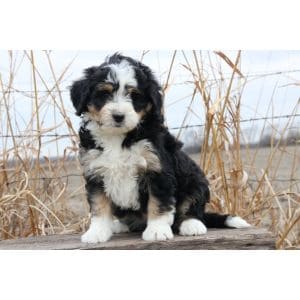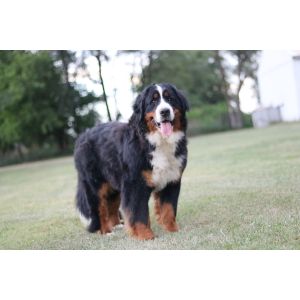
Bernedoodles make loyal, affectionate pets. Sometimes called Bernese Mountain Poos, they have a curly coat that is more hypoallergenic than your standard Bernese Mountain Dog.
They also display tremendous patience with children, making them excellent family dogs.
But nothing lasts forever. And while we don’t like to think about it, a Bernedoodle’s life expectancy is considerably shorter than our own. However reluctantly, that makes it natural to ask, ‘How long do Bernedoodles live?‘
On average, a standard Bernedoodle will live 12-15 years old, a miniature Bernedoodle will live 14-16 years old, and a toy Bernedoodle can live up to 18 years old. In general, the smaller your Bernedoodle, the longer that it will live. Keep reading to understand more about how we calculated a Bernedoodles lifespan.
Other articles you would like: How To Train A Bernedoodle? and Best Bernedoodle Breeders In The USA
Table of Contents
Bernedoodle Life Expectancy

There is no hard and fast rule for calculating Bernedoodle life expectancy. That said, two prominent factors affect a dog’s lifespan, and those are hybrid vigor and size.
When trying to estimate a Bernedoodle’s lifespan, you start by taking these things into account.
Hybrid Vigor
But first, what is hybrid vigor? It’s an expression that comes up frequently when discussing cross-bred dogs like the Bernedoodle.
Scientifically speaking, hybrid vigor refers to the degree of genetic variation you introduce into a dog by varying its pedigree.
The more you breed dogs for a particular outcome, like a hypoallergenic coat, the narrower the gene pool becomes and hybrid vigor decreases.
You can see that within the Bernedoodle lineage because certain coat types are more popular than others. That makes it natural for breeders to emphasize those traits.
But the result of that hyper-focused breeding is that it can affect the Bernedoodle life span. That’s because they don’t only inherit the positive characteristics of a particular parent.
They also receive the genes for potential health problems. And the higher the percentage of a particular dog breed, the higher the chance of those health problems is.
So, what is a Bernedoodle’s lifespan? It depends in part on the generation of Bernedoodle under discussion. An F1 or first-generation Bernedoodle has a high degree of hybrid vigor, so necessarily lives longer than an F3, or third-generation Bernedoodle.
How Long Do Toy Bernedoodles Live?
The other significant factor that determines a Bernedoodle’s lifespan is their size. Bernedoodles come in three sizes:
- Toy
- Miniature
- Standard
In the case of Toy and Miniature cross-breeds, it’s always a female Bernese Mountain Dog that carries the puppies.
That’s because even Toy and Miniature hybrids grow to be larger than their Poodle parents, and there is no way a female Poodle could carry these puppies to term without significant complications.
It’s also worth noting that small dogs live demonstrably longer than large dogs. The prevailing theory on why this should be is that larger dogs age faster than their smaller canine contemporaries.
That’s no less true of diminutive and standard Bernedoodles than it is of other dog breeds. So, how long do Toy Bernedoodles live?
On average, a Toy Bernedoodle weighs between 10-24lbs and grows to be approximately 12-17 inches long. At that size, with minimal health problems and an appropriate diet, they can live up to 18 years.
How Long Do Mini Bernedoodles Live?
Comparatively, the Miniature Bernedoodle has a lifespan of 14-17 years. A well-developed Mini Bernedoodle weighs between 25-49lbs and stands approximately 18-22 inches tall.
How Long Do Standard Bernedoodles Live?
Standard Bernedoodles are the largest size of Bernedoodle. They also have the shortest life expectancy.
In adulthood, a Standard Bernedoodle weighs roughly 50 lbs. When measured from shoulder to ground, they average between 23-29 inches tall.
A standard Bernedoodle’s lifespan averages between 12-15 years. You’ll notice that while this is longer than many large dogs, it’s still demonstrably the shortest Bernedoodle lifespan on this list.
It’s also important to remember that there are always exceptions to the rules. With the right care, a Standard Bernedoodle might live for an elderly 17. Similarly, a Toy Bernedoodle with health problems might not live longer than seven years.
There’s no way to predict your Bernedoodle’s life span, much as you might wish to. The best thing you can do is be aware of potential Bernedoodle health problems and try to keep on top of them.
Bernedoodle Health Problems

So, what are the most common Bernedoodle health problems? More importantly, what can you do about them?
Hip and Elbow Dysplasia
Hip and elbow dysplasia are common problems in large dogs. Unhelpfully, they are common problems in both Burmese Mountain Dogs and Poodles, so although reputable breeders screen for these problems, they can be difficult to avoid.
A dog with hip or elbow dysplasia suffers from hip or elbow joints that slip out of place regularly. Symptoms include:
- Difficulty/stiffness when standing
- Limited mobility
- Lameness in hind leg(s)
- Limping
- Decreased activity
- Enlarged shoulder muscles
It’s possible to try and manage dysplasia through chewable glucosamine or joint supplements. However, if the dysplasia is severe, your vet may advise operating to correct the joint problem.
Luxating Patella
Smaller dogs, like Toy Poodles, are less prone to Hip Dysplasia. However, they often suffer from something called Luxating Patella.
Luxating Patella occurs when the kneecap joint pops out of its socket. A classic indication of Luxating Patella is what owners call the ‘Bunny hop.’ Your dog may appear to walk or run on three legs, while ‘hopping’ intermittently on the fourth.
You may even notice your dog changing the side it hops on, depending on which knee joint plays up.
Most vets won’t feel a need to operate on Luxating Patella since the discomfort is minimal and dogs are adaptable. However, it can lead to arthritis later in life, and that may require more involved veterinary treatment.
Progressive Retinal Atrophy
Progressive Retinal Atrophy is what’s called an ‘autosomal recessive condition. For it to be present in a dog, both parents must have the gene for it.
If they do, the cells in your Bernedoodle’s retina start deteriorating over time. It can be tricky to spot initially because most dogs lose their night vision first. So, by the time you notice your Bernedoodle has trouble seeing, the condition may be advanced.
While not necessarily sex-linked, you are more likely to see Progressive Retinal Atrophy occurring in male dogs. Symptoms include:
- Reluctance to go out at night
- Difficulty navigating in low lighting
- Abnormally dilated eyes
- Eyes/ irises reflect light at viewer when shining light in eye
Von Willebrand Disease
Another Bernedoodle health problem is Von Willebrand Disease. Dogs with Von Willebrand Disease lack one of the necessary protein factors enabling blood to clot properly.
Bernese Mountain Dogs are prone to type 1 Von Willebrand, where the protein structure is normal, but the concentration of the von Willebrand protein is low.
Bernese Mountain Dogs can pass this trait on to Bernedoodles. Equally, the Bernedoodle may carry the disease without demonstrating the propensity for excessive bleeding seen in their parents. Common sites for bleeding include:
- Nose
- Mouth
- Intestinal Tract
- Urinary Tract
Many owners become aware of this disease when their dog demonstrates abnormal bruising after routine surgery, like neutering or spaying.
Managing Von Willebrand Disease involves plasma infusions during episodes of excessive bleeding and using Desmopressin acetate to encourage clotting.
However, Desmopressin acetate is only beneficial in dogs who, like the Bernedoodle or Bernese Mountain Dog, have Type 1 Von Willebrand.
Bandages, sutures, and wound glue can also be effective.
Bernedoodle Life Expectancy: Prolonging Your Dog’s Life

While it’s impossible to predict a Bernedoodle’s lifespan, there are things you can do to ensure your dog lives as long as possible.
Control Diet
One of the best things you can do to promote a long life for your Bernedoodle is to feed them appropriately.
It’s tempting to offer table scraps whenever they ask for them, but too many of these can lead to diabetes later in life.
Also, you want to avoid rawhide and bones. Dogs love them, but they can fracture or impact teeth. Not only are these conditions painful, but dental health can have ramifications for your dog’s sinuses, and even kidney or liver disease.
Manage Weight
Another way to help lengthen your Bernedoodle’s lifespan is by routinely exercising them. This mix comes from very active parent breeds, and benefits from routine exercise.
Whether that’s walking or fetch doesn’t matter. The important thing is that your Bernedoodle enjoys an active lifestyle.
This is true irrespective of your Bernedoodle’s size.
The other benefit of regular exercise is that it helps keep your Bernedoodle from gaining weight. That’s more than a cosmetic consideration because excessive weight gain can lead to painful conditions like arthritis in senior dogs.
Conclusion For “What Is a Bernedoodle’s Lifespan”

How long do Bernedoodles live? It varies from dog to dog. The answer to ‘What is a Bernedoodle’s lifespan?’ changes depending on size and hybrid vigor.
A Toy Bernedoodle can live for as many as 18 years, while a Mini Bernedoodle lives for approximately 14-17 years.
Standard Bernedoodles have the shortest life expectancy because they age faster than smaller breed mixes, and average between 12-15 years.
Carefully monitoring your Bernedoodle’s diet and ensuring they get enough exercise can help prolong their lifespan.
But there are no guarantees. Like many dogs, Bernedoodles can inherit a variety of health problems that could impact their life expectancy.
What’s important is that you take care of your Bernedoodle for as long as you have them. They are loyal, affectionate dogs and their companionship leaves a demonstrable imprint on their owners, however long you have them.
You will also like:
- Best Bernedoodle Rescues In The USA
- Do Bernedoodles Have Health Issues?
- What Is An Australian Bernedoodle?
For more information about the Bernedoodle Breed, check out the video below:




